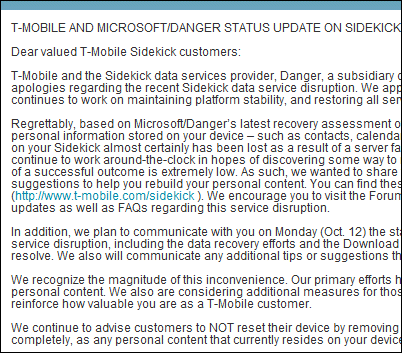Danger is a company acquired by Microsoft in April 2008, which provides synchronization and online data storage for mobile devices, the best-known being the T-Mobile Sidekick. Here’s the Danger promise:
Data is always synchronized and backed up
Danger-powered devices are always connected to the Danger service. All user data is automatically and securely backed up over-the-air, and emails, photos, and organzier data are automatically synchronized with a Web-based application. All changes that are made on the device are instantly and automatically reflected on the user’s computer, and vice versa.
That dream is in tatters thanks to a currently unspecified server failure. Problems started over a week ago, culminating in this devastating “status update”:
Regrettably, based on Microsoft/Danger’s latest recovery assessment of their systems, we must now inform you that personal information stored on your device – such as contacts, calendar entries, to-do lists or photos – that is no longer on your Sidekick almost certainly has been lost as a result of a server failure at Microsoft/Danger … we recognize the magnitude of this inconvenience.

The word “inconvenience” does not express what some users are experiencing. Here’s an example:
I too have lost business contacts (over 200), family and friends mailing, email address & phone #. Good luck now with holiday cards. Without my calendar, I now have no clue when all my upcoming appts are. In addition, I have lost passwords, account codes and my gym workout routine. I was unable to do my side jobs over the past two weekends without these codes. To recover the information will take hours of my time worth way more than the month of service credit in addition to the money I have already lost not being able to work.
The entire reason I chose to stay with the sidekick and renew with t-mobile was because of the piece of mind knowing that my data information was backed up to an online system.
So what next? People are drawing a variety of conclusions, the most obvious being either that the cloud can never be trusted, and/or that Microsoft can never be trusted. Of course there is no such thing as total data (or any other kind of) security, but risks can be minimized, and in the absence of nuclear war, earthquake or volcanic eruption this looks inexcusable – but bad things happen.
The company is promising an update tomorrow (October 12th). Personally I doubt that the data is really irrecoverable, knowing a little about what data forensics can achieve, but it may be economically irrecoverable. Still, the best thing Microsoft could do would be to announce that it can get the data back after all. Failing that, we need to understand as much as possible about what went wrong so that we can make our own judgment about what to conclude.
Presuming that the data does not reappear, this is going to get messy. What happens when the marketing information says one thing, but the small print says another (as is often the case)? One user found this in his contract:
The services and devices are provided on an “as-is” and “with all faults” basis and without warranties of any kind
which may well be typical. Then again, what about T-Mobile’s relationship with Microsoft?
Finally, while I accept that data may be safer in a cloud service provider’s data centre than on my cheap local hard drives, it is also obvious that cloud + local backup is even safer. Apparently this is one thing that Danger made somewhat difficult, and I’ve known this to be true of other cloud-based services.
Update: rumour has it that this was a failed SAN (Storage Area Network) upgrade without a backup. Further rumours of the poor state of Danger (and Windows Mobile) within Microsoft are in this RoughlyDrafted article.
I am confused though. The person who claims to have lost so much data, why would those details have been deleted from their mobile?
I can understand if it assumed the cloud service was more current than the phone and so deleted what was missing. However I would expect this service to not do that but in fact always assume the mobile is more current.
This is however why I still use traditional e-mail instead of GMail, Hotmail, etc. I do not trust anything in the cloud and never will. You simply do not know the companies backup policy.